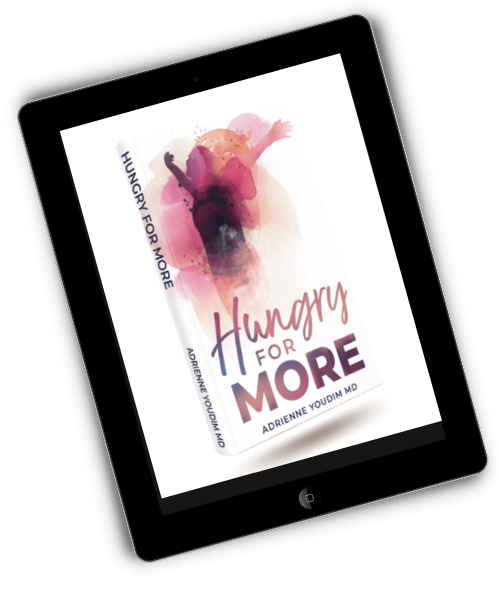Recently I spoke to several hundred executives over zoom. It was one of those days when the news was particularly hard to swallow and I felt like I needed a hug. And even though these folks were thousands of miles away and with me on a computer screen, I felt connected and wanted to hug them as well. And so at the end of my keynote, I asked them to put their left hand over their heart. Their right hand over their left hand and to give themselves a squeeze. The chat blew up….
I know how much we all could use a hug these days, and self-compassion in particular. In fact, I wrote about self-compassion extensively in my book, Hungry for More, And yet I am still floored when I witness the response to this small gesture of self-love.
Self-compassion becomes particularly important in our moments of self-discomfort when we experience our own setbacks and shortcomings and sadly there is so much discomfort around our bodies and our relationship with food, which is why a self-compassion practice is so critical. But as we will discuss a self-compassion practice is critical to far more than the numbers on the scale.
I have always promoted self-compassion in my practice with patients on their journey to healthier weight and better health. From experience, I know that we are better able to overcome our challenges and meet our goals when we act from a place of self acceptance and self-compassion. And, a recent study supported this notion.
A study of 140 people diagnosed to be overweight or have obesity showed that higher levels of self compassion was associated with reduced negative feelings following a dietary setback, less guilt and more positive feeling about themselves. Despite the setback, self-compassionate participants felt more in command of their eating habits, suggesting that self compassion can help people feel a sense of agency after a dietary lapse. They also not surprisingly reported better mood overall as compared to the group that did not practice self compassion.
This study counters the notion that being kind with ourselves makes us lazy or complacent. Rather it builds resilience. Self compassion counters the negative and self defeating self talk that sabotages us in pursuing our weight loss goals and our goals in general. That is the beauty of this work of coming to terms with our relationship with food. It is a mirror for our relationship with ourselves. And to that point, we can take this teaching out to our greater life goals. Meeting ourselves where we are at with self kindness, self love and self compassion allows us to persevere following setbacks so that we can resume the work of living our lives with purpose and intention.
You can hear the entire episode here including more info on the study referenced, details of a self compassion practice and how cultivating this practice is not only to your benefit but also in benefit to the greater good!
Wishing you a happy and healthy week filled with love and compassion for yourself.
Xx,


